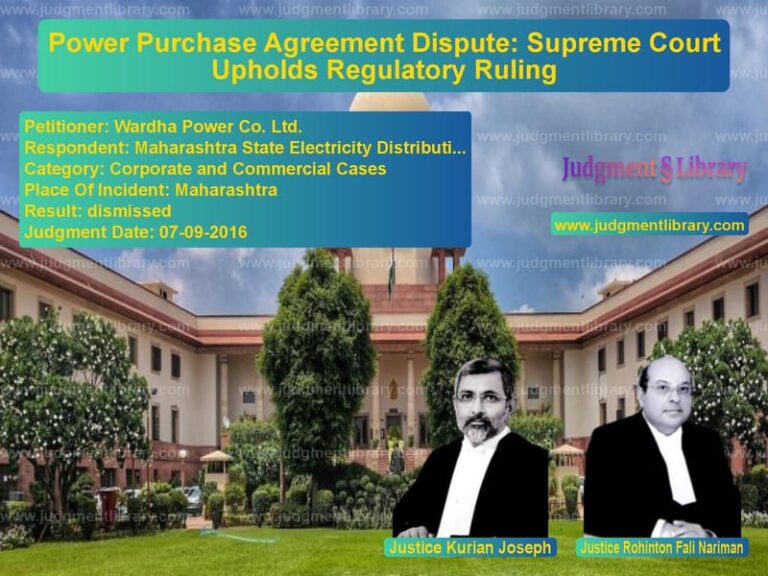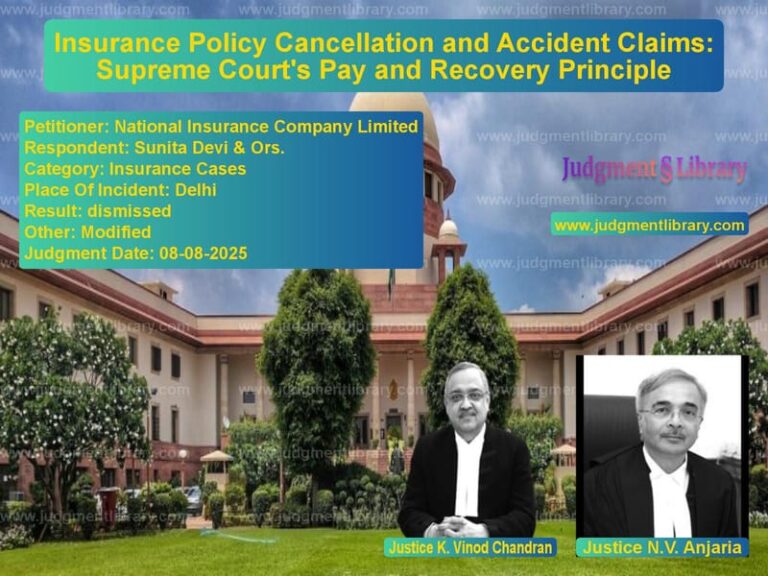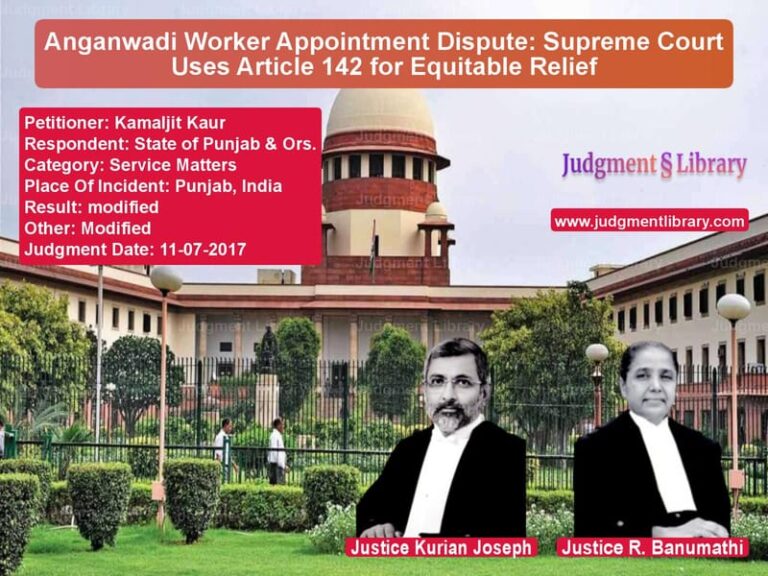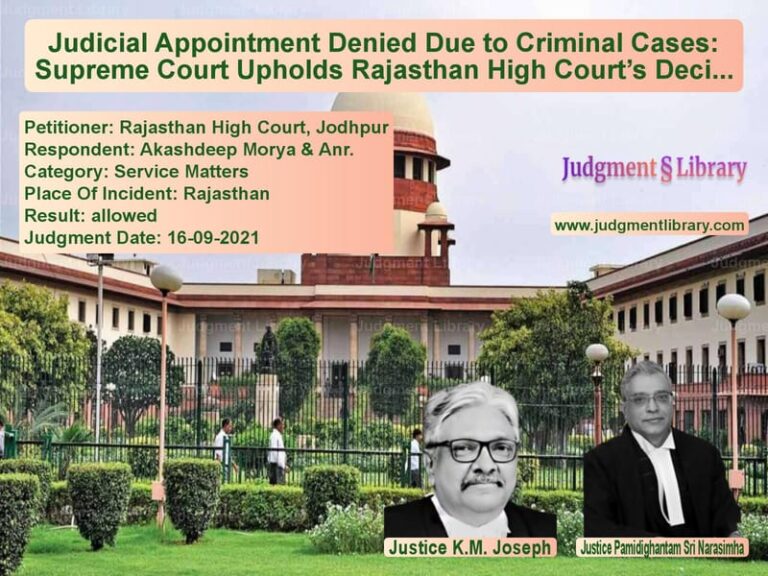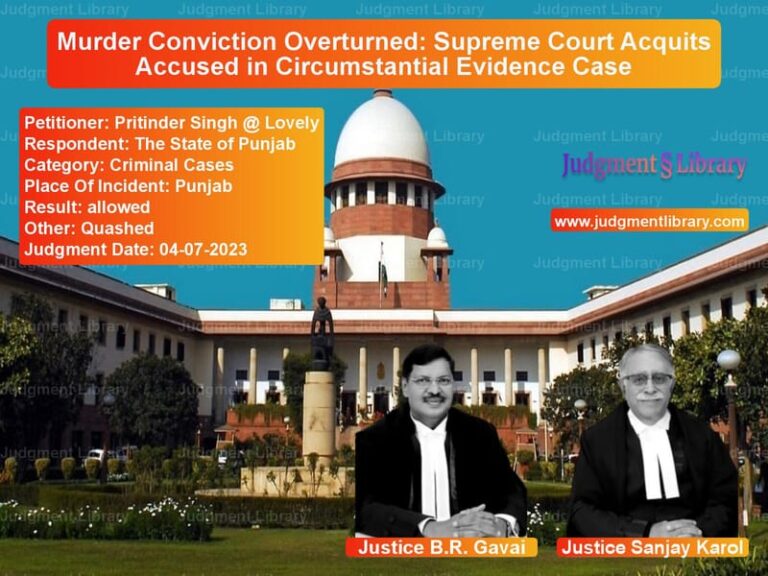Specific Performance and Property Rights: Supreme Court Ruling on Bangalore Development Authority Site Dispute
The Supreme Court of India recently addressed a dispute regarding the enforcement of a specific performance agreement in the case of G.T. Girish vs. Y. Subba Raju (D) by LRs and Another. This case revolved around the sale of a site allotted by the Bangalore Development Authority (BDA) and the legal enforceability of an agreement to sell when statutory restrictions were placed on such transactions.
Background of the Case
The dispute arose from a site allotted to the first defendant by the BDA on 04.04.1979. The first defendant entered into a lease-cum-sale agreement with the BDA, under which she was placed in possession of the site with restrictions on its alienation for ten years. On 17.11.1982, the first defendant entered into an agreement to sell the site to the plaintiff, committing to execute a sale deed once she obtained absolute title from the BDA.
The plaintiff claimed to have paid an advance and was put in possession of the property. However, the first defendant later denied the plaintiff’s rights and refused to execute the sale deed. The plaintiff filed a suit for specific performance, which was rejected by the trial court but allowed by the High Court.
Petitioner’s Arguments
The petitioners, represented by Senior Advocate Kiran Suri, contended that:
- The agreement was unlawful as it contravened public policy and violated Section 23 of the Indian Contract Act, 1872.
- The lease-cum-sale agreement with the BDA prohibited alienation for ten years, making the agreement to sell void.
- The suit was premature as the first defendant had not obtained absolute title at the time of filing.
- The second defendant, who later purchased the property, was a bona fide purchaser without notice of the agreement.
Respondent’s Arguments
The respondent, represented by Senior Advocate R. Basant, argued that:
- The agreement was valid, as the BDA rules did not expressly prohibit agreements to sell.
- The plaintiff had always been ready and willing to perform his part of the contract.
- The High Court correctly applied the doctrine of lis pendens to hold that the subsequent sale to the second defendant was subject to the plaintiff’s rights.
- The trial court erred in denying specific performance based on technical grounds.
Supreme Court’s Observations
The Supreme Court, comprising Justices K.M. Joseph and P.S. Narasimha, examined the legality of the agreement under Section 23 of the Indian Contract Act. The Court noted:
“The agreement to sell, on its terms, necessarily contravened the statutory restrictions imposed by the BDA. Enforcing such an agreement would defeat the object of the law.”
“The contract was unenforceable as it clearly attempted to bypass the public policy underlying the restrictions on alienation.”
Key Legal Findings
The Supreme Court ruled on several important legal principles:
- Illegality of the Agreement: The agreement violated statutory provisions and was therefore void under Section 23 of the Contract Act.
- Doctrine of Lis Pendens: The subsequent sale to the second defendant was subject to the outcome of the litigation, but it did not make the sale void.
- Prematurity of the Suit: The Court held that the plaintiff should have waited until the first defendant obtained the sale deed from the BDA before filing the suit.
- Relief under Article 142: Despite dismissing the suit for specific performance, the Court directed the defendants to pay the plaintiff Rs. 20,00,000 as compensation.
Final Judgment
The Supreme Court allowed the appeals, setting aside the High Court’s judgment and dismissing the suit for specific performance. However, to do complete justice, it directed the petitioners to pay Rs. 20,00,000 to the plaintiff as compensation.
Legal Implications
This ruling has significant implications for property law and contractual agreements:
- Agreements that contravene statutory restrictions will not be enforced, even if they are executed in good faith.
- The doctrine of lis pendens protects pending litigation but does not automatically nullify subsequent transfers.
- Courts can grant alternative reliefs under Article 142 to balance equities between parties.
Conclusion
The Supreme Court’s decision reinforces the importance of adhering to statutory provisions in property transactions. It sends a strong message that agreements circumventing legal restrictions will not be upheld, while also ensuring fairness by granting monetary compensation to the aggrieved party.
Petitioner Name: G.T. Girish.Respondent Name: Y. Subba Raju (D) by LRs and Another.Judgment By: Justice K.M. Joseph, Justice P.S. Narasimha.Place Of Incident: Bangalore, Karnataka.Judgment Date: 18-01-2022.
Don’t miss out on the full details! Download the complete judgment in PDF format below and gain valuable insights instantly!
Download Judgment: g.t.-girish-vs-y.-subba-raju-(d)-by-supreme-court-of-india-judgment-dated-18-01-2022.pdf
Directly Download Judgment: Directly download this Judgment
See all petitions in Property Disputes
See all petitions in Specific Performance
See all petitions in Damages and Compensation
See all petitions in Contract Disputes
See all petitions in Judgment by K.M. Joseph
See all petitions in Judgment by P.S. Narasimha
See all petitions in dismissed
See all petitions in Modified
See all petitions in supreme court of India judgments January 2022
See all petitions in 2022 judgments
See all posts in Civil Cases Category
See all allowed petitions in Civil Cases Category
See all Dismissed petitions in Civil Cases Category
See all partially allowed petitions in Civil Cases Category


